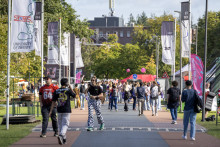A so-called 'application fee' of 75 euros for anyone without a Dutch VWO diploma who applies for a UT bachelor's programme. The UT wants to levy this from next academic year, in order to reduce the number of low-potential applications. It should also reduce the workload at the Centre for Educational Support (CES) - the assessment of non-EU applications in particular takes a lot of time. The Executive Board made a proposed decision at the end of August, and on Wednesday the University Council had the right of consent.
Three negative opinions
For a moment, it seemed that the council would reject the proposal. Emile Dopheide (Campus Coalition) listed several negative recommendations from Platform International Affairs (PIA), University Committee for Education (UC-E) and Platform Educational Contact Persons. 'It is also difficult to prove that this decision does not have a negative effect on registration,' says Dopheide. He also said that the council believes there is too much focus on the capacity at CES to advocate for the 'application fee'.
At the same time, the University Council also saw the benefits of the introduction of registration fees. Within the UT, the faculties of ET and EEMCS have been using the instrument in master's programmes for some time and the results are positive. Moreover, almost every Dutch university charges such an application fee. The council therefore voted in favour of the Executive Board's decision, but asked for four elements to be taken into account. The most important one: an opt-out option for each programme.
Promising applications
Rector Tom Veldkamp understood the latter proposal, but indicated that he did not want to go along with it. 'Then I can already predict what will happen: then we will have a lot of exceptions in no time and that is not what you want. Moreover, there is already a long list of exceptions that students are eligible for. I do, however, support the proposal to monitor and evaluate this initiative together. This instrument can help to pay more attention to promising applications compared to more low-potential applications.'
When the Executive Board and the University Council were on the same page, and the latter agreed to certain conditions, Dopheide proposed to increase the rate as well. From 75 euros to one hundred euros, the rate charged by other Dutch universities. 'It's a bit weird if we're the only ones asking for 75 euros'.







